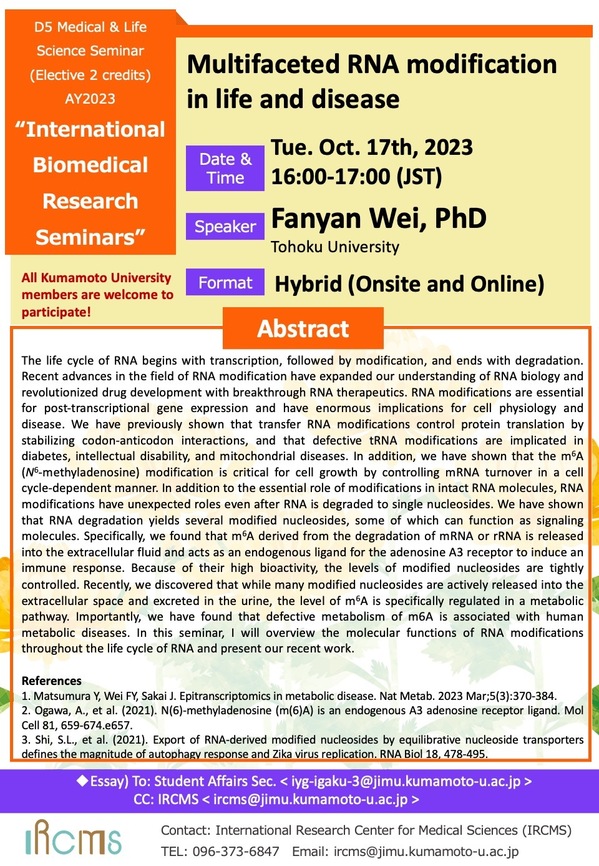- HOME
- News & Events
- [Oct. 17] D5 Seminar- Dr. Fanyan Wei (Tohoku University)
News & Events
[Oct. 17] D5 Seminar- Dr. Fanyan Wei (Tohoku University)
October 11 2023
The "D5 Medical & Life Science Seminar" course will be offered by International Research Center for Medical Sciences (IRCMS). It will run from May 2023 to March 2024, with lectures given by scientists who are affiliated with IRCMS or in collaboration with researchers at IRCMS. The lectures will be given once a month, in English, and by leading scientists in the relevant research field. Students will be taught: 1) how normal physiological functions are maintained in the human body; 2) how these systems become abnormal under certain pathophysiologic conditions; 3) why stem cells are important in animal development and homeostasis; 4) how stem cell-based approaches can help us understand disease mechanisms and find potential cure for diseases related to stem cell malfunction (e.g., cancer, aging).
Anyone who wants to join is welcome.
For students who have registered for the course, please check your attendance in Moodle.
Date : October 17th, 2023 (Tuesday)
Format : Hybrid (Onsite & Online)
Time : 16:00 - 17:00 (JST)
Speaker : Dr. Fanyan Wei (Tohoku University)
Title : Multifaceted RNA modification in life and disease
Abstract :
The life cycle of RNA begins with transcription, followed by modification, and ends with degradation. Recent advances in the field of RNA modification have expanded our understanding of RNA biology and revolutionized drug development with breakthrough RNA therapeutics. RNA modifications are essential for post-transcriptional gene expression and have enormous implications for cell physiology and disease. We have previously shown that transfer RNA modifications control protein translation by stabilizing codon-anticodon interactions, and that defective tRNA modifications are implicated in diabetes, intellectual disability, and mitochondrial diseases. In addition, we have shown that the m6A (N6-methyladenosine) modification is critical for cell growth by controlling mRNA turnover in a cell cycle-dependent manner. In addition to the essential role of modifications in intact RNA molecules, RNA modifications have unexpected roles even after RNA is degraded to single nucleosides. We have shown that RNA degradation yields several modified nucleosides, some of which can function as signaling molecules. Specifically, we found that m6A derived from the degradation of mRNA or rRNA is released into the extracellular fluid and acts as an endogenous ligand for the adenosine A3 receptor to induce an immune response. Because of their high bioactivity, the levels of modified nucleosides are tightly controlled. Recently, we discovered that while many modified nucleosides are actively released into the extracellular space and excreted in the urine, the level of m6A is specifically regulated in a metabolic pathway. Importantly, we have found that defective metabolism of m6A is associated with human metabolic diseases. In this seminar, I will overview the molecular functions of RNA modifications throughout the life cycle of RNA and present our recent work.
References
1. Matsumura Y, Wei FY, Sakai J. Epitranscriptomics in metabolic disease. Nat Metab. 2023 Mar;5(3):370-384.
2. Ogawa, A., et al. (2021). N(6)-methyladenosine (m(6)A) is an endogenous A3 adenosine receptor ligand. Mol Cell 81, 659-674.e657.
3. Shi, S.L., et al. (2021). Export of RNA-derived modified nucleosides by equilibrative nucleoside transporters defines the magnitude of autophagy response and Zika virus replication. RNA Biol 18, 478-495.

